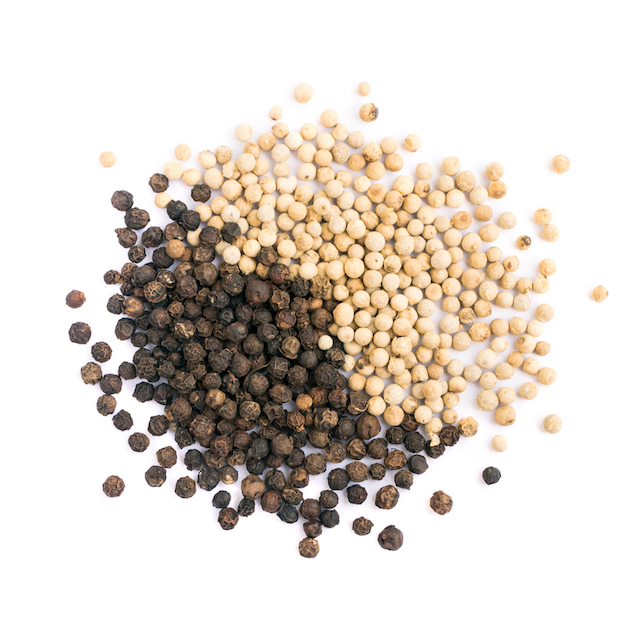A Guide to Black Pepper

Everything you ever wanted to know about the small but mighty sweetheart of spice.
When it comes to cooking, “now season your food” almost always translates to “add a pinch of salt and pepper” – aka the ultimate duo of the kitchen counter. And while a light sprinkling of sodium makes sense, what does grinding on the black stuff really do? And how did black pepper become a mainstay of spice racks across the world?
Let’s start with a little background on the world’s favourite spice.
What is black pepper?
Black pepper starts life as berries in a clump on a flowering vine (like grapes). The berry is picked just before it is fully ripe, then dried until it shrivels and the skin turns black or dark brown, producing what we know as black peppercorns.
Where does black pepper originate?
Native to Southern India, today black pepper is grown throughout the tropics. As the world’s most popular spice, it is grown and harvested throughout the world’s major spice regions, from Indonesia to Ecuador and Brazil. And, just as with grapes used in wine making, the soil and growing conditions have an impact on flavour profile.
Black pepper vs white pepper: what’s the difference?
The main difference between white and black pepper is how they’re picked and processed, which in turn affects the flavour and potency.
White pepper, like black pepper, is made from the berries of the pepper plant, also known as the Piper nigrum. However, for white pepper these berries are picked at full ripeness.
They’re then soaked in water to ferment, before the outer layer is removed leaving only the inner seed. Because the skin is removed, some of the flavour is taken, including the piperine, which results in white pepper being milder than black pepper.

Different types of black pepper
There are many varieties of blackpepper, but Tellicherry and Lampong are two of the most prized. Lampong is known for its strong citrusy aromas and it’s slow burn that evolves into a more intense heat. Tellicherry peppercorns, on the other hand, are revered for their complex aroma and bright flavours.
Alternatives to black pepper
If you’re looking for a substitute for black pepper there are several replacements that can pack a similar punch waiting on the spice rack, condiment shelf and produce aisle.
A pinch of dried chilli flakes is your best bet. Alternatively, a dash of Tabasco, mustard or horseradish spread will also add some heat. Lastly, a fresh peppery leaf, such as mustard or rocket, will mimic black peppers flavour.
Cooking with black pepper
Black peppercorns have the strongest flavour of the peppercorn family, which comes from piperine, a chemical compound found in the skin. Just a freshly-ground-pinch will add a bit of background heat, as well as some deliciously earthy zing to your food.
Delicious as it may be, many suggest that there’s a time and a place for black pepper, rather than a need to add it to almost every meal.
That’s because, unlike salt, black peppers’ bitter bite and strong aroma don’t enhance the flavour of a dish. In fact, the two seasonings have opposite effects: while salt is used to coax out pre-existing flavour from foods, black pepper often changes or overshadows them. Think of black pepper as the yin to salt’s yang.
The golden rule is think before you add a pinch, and only reach for the black pepper if what you’re cooking will benefit from the subtle flavours and heat this spice will add.
How to grind black pepper
Black pepper is available whole, cracked, and either coarsely or finely ground. But, whenever possible, invest in a pepper mill and use whole peppercorns – you’ll be rewarded with more vibrant and powerful flavours than if you use pre-ground.
With a flick of the wrist a good grinder can crush black peppercorns to a fine or coarse texture (depending on your recipe or personal preference).
Some recipes, however, call for whole peppercorns to be crushed in a pestle and mortar, which works well when they’re being used as a coating. For the best results rock and smash your peppercorns in the mortar. This is a process of gently going around the pestle with the mortar to gather any ingredients that have climbed up the sides, then pushing them into the middle and bearing down.

Black pepper storage
Store your whole black peppercorns in an airtight container away from direct sunlight to maintain the freshness of the essential oils.
Health benefits of black pepper
Black pepper offers well-documented health benefits and is prized as a powerful antioxidant. Compounds found in the spice — especially its active ingredient piperine — are said to protect against cell damage, improve nutrient absorption, and aid digestive issues.



